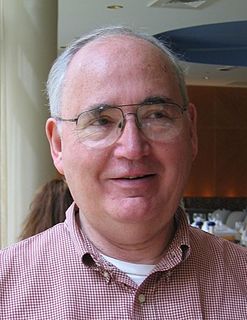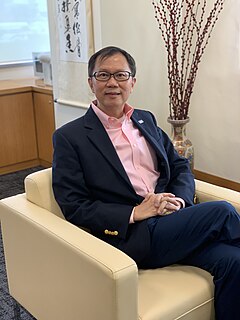Related Research Articles

Dana Stewart Scott is an American logician who is the emeritus Hillman University Professor of Computer Science, Philosophy, and Mathematical Logic at Carnegie Mellon University; he is now retired and lives in Berkeley, California. His work on automata theory earned him the Turing Award in 1976, while his collaborative work with Christopher Strachey in the 1970s laid the foundations of modern approaches to the semantics of programming languages. He has worked also on modal logic, topology, and category theory.

George Arthur Akerlof is an American economist who is a university professor at the McCourt School of Public Policy at Georgetown University and Koshland Professor of Economics Emeritus at the University of California, Berkeley. He won the 2001 Nobel Memorial Prize in Economic Sciences.

Oliver Eaton Williamson was an American economist, a professor at the University of California, Berkeley, and recipient of the 2009 Nobel Memorial Prize in Economic Sciences, which he shared with Elinor Ostrom.

Richard Manning Karp is an American computer scientist and computational theorist at the University of California, Berkeley. He is most notable for his research in the theory of algorithms, for which he received a Turing Award in 1985, The Benjamin Franklin Medal in Computer and Cognitive Science in 2004, and the Kyoto Prize in 2008.
The Haas School of Business is the business school of the University of California, Berkeley. The first of its kind to be founded at a public university in the United States, it is ranked among the best business schools in the world by The Economist, Financial Times, QS World University Rankings, U.S. News & World Report, and Bloomberg Businessweek.

Li Choh-ming was a Chinese-born American economist and educator. He was the founding Vice-Chancellor of the Chinese University of Hong Kong in 1963. He compiled The Li Chinese Dictionary (Cantonese-Mandarin). He was an economics professor at the University of California, Berkeley and at Nankai University in Tiensien during his academic career.
The Helen Wills Neuroscience Institute (HWNI) at the University of California, Berkeley was created in 1997, through a bequest from eight-time Wimbledon champion Helen Wills Moody, an alumna of UC Berkeley.
Neil Joseph Smelser (1930–2017) was an American sociologist who served as professor of sociology at the University of California, Berkeley. He was an active researcher from 1958 to 1994. His research was on collective behavior, sociological theory, economic sociology, sociology of education, social change, and comparative methods. Among many lifetime achievements, Smelser "laid the foundations for economic sociology."
The economic lot scheduling problem (ELSP) is a problem in operations management and inventory theory that has been studied by many researchers for more than 50 years. The term was first used in 1958 by professor Jack D. Rogers of Berkeley, who extended the economic order quantity model to the case where there are several products to be produced on the same machine, so that one must decide both the lot size for each product and when each lot should be produced. The method illustrated by Jack D. Rogers draws on a 1956 paper from Welch, W. Evert. The ELSP is a mathematical model of a common issue for almost any company or industry: planning what to manufacture, when to manufacture and how much to manufacture.

David John Teece, CNZM, is a New Zealand-born US-based organizational economist and the Professor in Global Business and director of the Tusher Center for the Management of Intellectual Capital at the Walter A. Haas School of Business at the University of California, Berkeley.
Ernst Bernard Haas was a German-American political scientist who made numerous contributions to theoretical discussions in the field of international relations.

Teck-Hua Ho is a Tan Chin Tuan Centennial Professor at the National University of Singapore (NUS). He is also the senior deputy president and provost at NUS. Prior to joining NUS, he was the William Halford Jr. Family Professor of Marketing at the Haas School of Business. He is also the executive chairman of AI Singapore, a national research and development programme.
Ellis Lane Johnson is the Professor Emeritus and the Coca-Cola Chaired Professor in the H. Milton Stewart School of Industrial and Systems Engineering at Georgia Institute of Technology in Atlanta, Georgia.

Gerald L. Thompson was the IBM Professor of Systems and Operations Research (Emeritus) in the Tepper School of Business of Carnegie Mellon University.
Eugene Leighton (Gene) Lawler was an American computer scientist and a professor of computer science at the University of California, Berkeley.

Thomson McLintock Whitin was an American management scientist, and Emeritus Professor of Economics and Social Sciences at Wesleyan University, known for his work on inventory control and inventory management.

Jackson Nickerson is an American academic who studies leadership, organizations, and strategy. Nickerson was the Frahm Family Professor of Organization and Strategy (Emeritus) in Olin Business School at Washington University in St. Louis. He also was the associate Dean and Director of Brookings Executive Education from 2009-2017 and was a non-resident Senior Fellow in Governance Studies at the Brookings Institution from 2010-2020.
John Morgan is the Oliver E. Williamson and Dolores J. Williamson Chair in the Economics of Organizations at the University of California, Berkeley.
Dr. Omar Romero-Hernandez is a Mexican academic, engineer, and researcher who currently serves as a professor at U.C. Berkeley's Haas School of Business and at the Hult International Business School. He was the recipient of the 2010 Franz Edelman Award for Achievement in Operations Research and the Management Sciences.
References
- ↑ Jack D. Rogers: A Computational Approach to the Economic Lot Scheduling Problem, Management Science, Vol. 4, No. 3, April 1958, pp. 264–291
- ↑ Jianhua Yang, Athula Ginige, Heinrich C. Mayr (2009) Information Systems: Modeling, Development, and Integration. p. 142-3
- ↑ Frederick E. Balderston, Austin Hoggatt, Richard H. Holton (2002) "IN MEMORIAM: Jack D. Rogers, Professor of Business Administration, Emeritus, Berkeley 1919—2002 Archived 2015-04-15 at the Wayback Machine ." senate.universityofcalifornia.edu